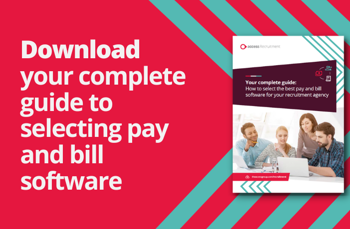 Pay and Bill
Pay and Bill
Recruitment payroll vs Payroll software: Key differences and why it matters
When it comes to managing payroll, not all solutions are created equal. Businesses - from small companies to large enterprises - often search for the right payroll software system to meet their specific needs. But what happens when your business is in the recruitment industry?
Recruitment payroll systems come with unique challenges that generic payroll software may not fully address. In this article, we break down the key differences between recruitment payroll and generic payroll software, answer common questions about how payroll systems work, and help you decide which solution is best for your business.
Table of contents
What is payroll software?
Payroll software, sometimes known as a payroll system, automates the process of paying employees, managing deductions, and ensuring compliance with government regulations such as HMRC requirements in the UK. Many companies turn to popular options like Access, Sage Payroll, Xero Payroll, Pegasus Opera Payroll or QuickBooks payroll software.
Whether you’re running a cloud-based payroll solution or an on-premise system, these platforms are designed to streamline routine payroll tasks and simplify complex calculations - from tax withholdings to benefit contributions.
Payroll software: features and benefits
Generic payroll software is built to serve a wide variety of industries. It is ideal for businesses that need a robust solution to handle standard payroll functions. Key features often include:
- Compliance and Accuracy: Ensuring that payroll calculations comply with legal requirements, such as those outlined by HMRC.
- Automation: Simplifying repetitive tasks like processing salaries, calculating deductions, and generating payslips.
- Reporting: Offering detailed analytics and reporting features for budgeting and forecasting.
- Integration: Seamlessly connecting with other HR systems, accounting software, and business management platforms.
- Scalability: Catering to various business sizes, from payroll software for small business needs to more complex demands of payroll software for large companies and medium sized business.
Generic payroll systems work well for many organisations by offering the standard payroll software features that most HR departments need.
Recruitment payroll software: tailored for staffing and recruitment agencies
Recruitment payroll software, on the other hand, is designed with the specific challenges of the recruitment industry in mind. Staffing agencies and recruitment companies often manage complex workflows that go beyond routine payroll tasks. For instance, these systems incorporate:
- Specialised billing and invoicing: Recruitment agencies must often manage candidate placements, commission splits, and client invoicing. Dedicated recruitment payroll systems streamline these processes.
- Margin and fee management: In the recruitment space, calculating margins and handling varying fee structures are essential. These systems offer tools to ensure accuracy when managing contractor pay and client billing.
- Integration with recruitment processes: A tailored solution such as Access Pay and Bill or FastTrack360 integrates payroll with recruitment-specific functions - linking candidate data held in CRMs, timesheets, and billing into one seamless workflow.
- Compliance for staffing agencies: Beyond general HMRC requirements, recruitment payroll systems are built to manage the unique compliance and reporting needs of staffing agencies, ensuring all statutory and industry-specific regulations are met, such as calculating holiday pay for temporary workers, and Agency Workers Regulations (AWR).
For recruitment businesses, using staffing agency payroll software can mean the difference between spending hours manually reconciling data and having a fully integrated system that handles everything from candidate payments to client invoices.
Key differences between recruitment payroll and payroll software
When comparing the two solutions, several key features emerge:
| Requirements | Payroll software | Recruitment payroll software |
| Target audience |
Any business needing standard payroll processing |
Recruitment and staffing agencies |
| Core functions |
Salary processing, tax calculations, deductions, and benefits |
In addition to core payroll, specialised client invoicing, margin management, integrated time interpreter and candidate pay |
| Integration |
Integrates with HR and accounting systems |
Seamless integration with applicant tracking (ATS) and recruitment CRM systems |
| Compliance |
Meets statutory requirements (e.g. HMRC recognised payroll software) |
Tailored to both general compliance and recruitment-specific regulations, such as AWR |
|
Reporting & Analytics |
Standard financial and HR reports |
As well as standard integrations, provides detailed recruitment performance metrics, invoicing accuracy, and fee analysis |
While generic payroll software addresses the basic needs of processing employee pay, recruitment payroll systems add another layer of functionality that tackles the unique challenges of the recruitment industry.

How does a payroll system work?
Understanding how a payroll system works can help you appreciate the benefits of both generic and recruitment-specific solutions. In essence, a payroll system automates:
- Data Collection: Gathering employee details, attendance, and work hours.
- Calculation: Processing gross pay, deductions, taxes, and net pay.
- Compliance: Ensuring all calculations adhere to legal standards and tax codes (for example, using HMRC recognised payroll software).
- Disbursement: Issuing payments to employees through direct deposit or other payment methods.
- Reporting: Generating payslips, reports, and analytics for future planning.
For recruitment agencies, these steps are augmented by additional layers that address client billing, contractor management, and recruitment-specific cost allocations.
Which payroll software is right for your business?
Choosing between generic payroll software and recruitment payroll systems largely depends on your business model:
- For businesses outside recruitment: Generic payroll software, like the popular options including Access Payroll, Sage, Xero, Pegasus Opera or QuickBooks, should be perfectly suitable for managing employee payroll efficiently.
- For recruitment agencies: When it comes to complex billing cycles, client invoicing, meeting temporary worker regulations and margin calculations, a recruitment-specific solution like recruitment pay and bill software (powered by FastTrack360) is designed to address these unique needs. It streamlines processes and reduces errors, saving time and money, and ultimately protecting the cash flow of your recruitment business.
Both types of systems share fundamental payroll functions, but recruitment payroll systems stand out by delivering additional features essential for staffing and recruitment agencies.
Read more about how to choose the best payroll software for recruitment agencies.
Conclusion
In summary, while generic payroll software provides a comprehensive solution for processing employee pay and meeting statutory requirements, recruitment payroll systems are tailor-made to handle the intricacies of staffing agency operations. By understanding the different types of payroll software systems available, you can choose a solution that not only ensures accuracy and compliance but also drives efficiency and profitability for your recruitment business.
Ready to streamline your payroll and billing processes? Discover how Access Recruitment’s FastTrack360 pay and bill software can transform your recruitment operations.
See recruitment payroll software in action
Resources

How to select the best pay and bill software for your recruitment agency
Selecting the right recruitment payroll and billing software can be a challenge. Read a complete guide for recruitment agencies on how to find, evaluate and review pay and bill software that is best suited to your organisation and your staff.

HMRC recognised payroll, billing and invoicing solutions for recruitment agencies
We are uniquely positioned to support your agency with a range of solutions, from SaaS, to bespoke, to outsourcing – whatever your requirements, we are here to help transform your payroll processes.

Powerful payroll and billing software to accelerate and streamline your processes
Access FastTrack360 allows you to pay workers and bill clients with precision and speed from one cloud-based system, uniquely configured to your business.
